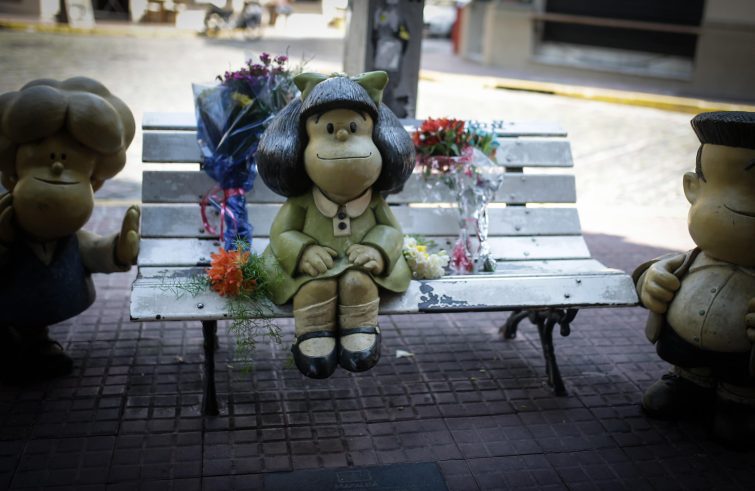
“Mafalda is an angry heroine who rejects the world as it is,” Umberto Eco wrote about the iconic character created by Joaquin Salvador Lavado, aka Quino, passed away on 30 September at the age of 88. He was born in Mendoza, Argentina, and soon emerged as a compulsive cartoonist who eventually became one of the leading visual artists of the 1950s and beyond. Incidentally, after the military coup in 1976 he moved to Italy for some time because, as he used to say, his Mafalda, always angry and hypercritical, would have become a desaparecida.”
Luckily Mafalda, born in 1962, did not continue advertising washing machines,
for which she had been created: already at that time her vitriolic observations and her vocation as a nagging little pest had irritated the customer, the owner of the Mansfield washing machines. This young girl then became an adoptive citizen of Buenos Aires, featured in the prestigious pages of El Mundo, quickly becoming an accomplished comic strip diva. There must have been a good reason if her creator defined her as a genuine political antagonist, but before the Argentine military dictatorship, she was silenced by Francoist Spain.
Indeed, Mafalda was not a politician by profession, but a pest:
she always had something to object about everything, identifying the weaknesses and failings in the claims of her interlocutors. But she was a pleasant little pest, for she was lonely after all: which kid could have ever fallen in love with someone who found flaws in virtually anything, and who ultimately made philosophical assessments, as when she asked her mother, as she was washing piles of dishes and saucepans, what would she have done if only she could have lived? Mafalda is a little girl who embodies the spirit of the 1968 generation, although she was born five years earlier, but without its ideological and political drifts.
Her contestation of the establishment is, overall, a matter of common sense, or rather, a search for the very meaning of a life of recurring patterns and automatisms.
She was the classmate who showed little enthusiasm for the “discoveries” of her peers, a wet blanket for naive enthusiasts, valued perhaps for her analytical intelligence, but bound to remain a spinster for life. Indeed, seeing the critical aspect of every human reality can be depressing. But this little pest was not born to grow up, get married and raise children. Together with Linus and Lucy, who resembles her younger sister (Lucy was born about ten years earlier) and the prehistoric BC strip, she became the icon, or rather the icons, owing to her constant presence over the years, of generations of children and adults who bought “her” diaries or read “her” comic strips.
Is it merely the adult projection of a child’s imagination? It’s obviously not. The witty jokes or the abysmally – and unconsciously – insightful questions of real children
show that Mafalda was more than just an intellectual creation, she was the focal point of the seismic activity of heart and mind.
It took an annoying little girl to realize what Pascoli dreamt of, namely the encounter between the adult man and the child within us.








